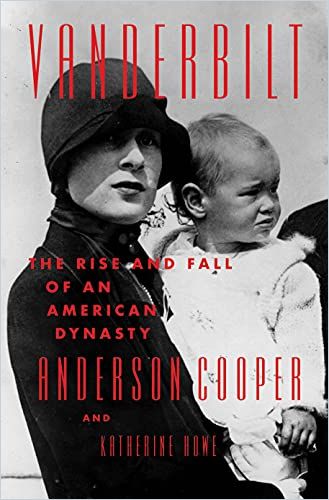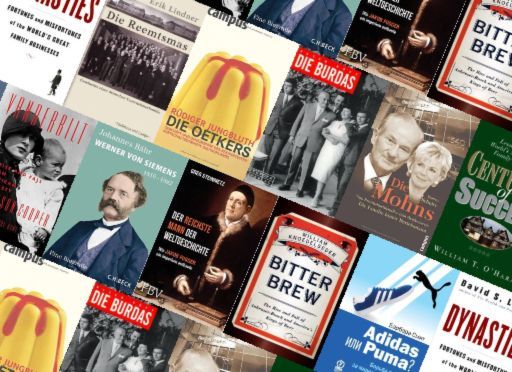CNN’s Anderson Cooper tells his forebears’ amazing tale: once America’s richest clan, they wasted it all.

American Empire (now defunct)
In the 20th century, the name Vanderbilt meant conspicuous wealth, dissipation and designer jeans. Cornelius Vanderbilt created one of the country’s greatest fortunes by building railroad and shipping networks in the 19th century. Within 100 years, most of his wealth was gone. With affection and irony, CNN anchor Anderson Cooper, son of artist and designer Gloria Vanderbilt, recounts his family’s fabled rise and public fall.
The Commodore
When Cornelius Vanderbilt – “the Commodore” – died in 1877, he left his family $100 million, $2 billion in today’s dollars.
In Cornelius’s history, there is little evidence of, or room for, delicate feelings or emotions. It was money he wanted. Anderson Cooper
Vanderbilt became wealthy by exploiting America’s growing transportation network, on land and at sea. He married at 19 and had 13 children with his wife Sophia. Nine daughters and two sons survived him, but he left his daughters nothing when he died at age 82.
One son, Cornelius Jeremiah Vanderbilt, suffered from epilepsy; the family shunned him. The other son, William (Billy) Vanderbilt, became vice president of Vanderbilt’s railroad empire. By the late 19th century, the Vanderbilts were the richest family in America.
Swells
In New York in the late 19th century, several well-to-do families invented a pseudoaristocracy. Society queen Caroline Astor ruled from 1870 to 1890, and determined that only families separated by at least three generations from the “dirty” commercial businesses that made them wealthy were eligible for social acceptance. Astor was a self-described “nob” – old money; the Vanderbilts were “swells” – rich, social-climbing nobodies.
New York’s top families owned boxes at the Academy of Music, which barred emerging captains of industry: the Vanderbilts, Goulds, Rockefellers and Morgans. These men underwrote the Metropolitan Opera House. Its instant success forced Caroline Astor to concede that in America, ostentatious wealth trumped pedigree. The Academy closed in 1885.
When Cornelius Vanderbilt II inherited Billy Vanderbilt’s fortune – worth $3 billion today – the Vanderbilts were part of the Gilded Age immortalized in Edith Wharton’s novels. The early 20th century belonged to the Vanderbilts and other “nouveau riche arrivistes.”
Alva Vanderbilt
In 1875, William “Willie” Vanderbilt married Alva Erskine Smith, who was ferociously ambitious and possessed remarkable taste. Willie Vanderbilt’s gift was spending, not earning.
Alva Vanderbilt studied “the Astor set” and sought to impress them with the “greatest ball of the 19th century,” in 1883. Wearing hundreds of diamonds and a Venetian princess gown, Caroline Astor graced the party after years of snubbing the Vanderbilts. Alva Vanderbilt “out-Astored” her, however, wearing a long string of perfectly matched, uncultured pearls that had belonged to Catherine the Great. The ball cost the Vanderbilts an astonishing $250,000 at a time when a maid in their household earned approximately $1 a day.
If marriage is a protection for the woman against many wrongs, divorce is also an escape from many degrading evils. (Alva Vanderbilt, 1917)
Alva Vanderbilt prided herself on setting an example for other women to free themselves from loveless marriages to philandering fools. A suffragist, she founded the Women’s Political Equality League in 1909 and spent her wealth on soup kitchens and housing projects. Though her father had owned enslaved people, she supported integrating Black feminists into the suffragist movement. Alva crusaded for women’s rights, but held most of her female peers in “venomous contempt.”
Consuelo Vanderbilt
Alva Vanderbilt’s daughter, Consuelo, was graceful, long-necked and dark-haired with a sensitive oval face. Consuelo was in love with and secretly engaged to New York socialite Winthrop Rutherford. Instead, Alva forced Consuelo to marry the older but wealthy Duke of Marlborough. Her memoir, The Glitter and the Gold (1952), revealed her heartbreak at losing the man she loved to marry the Duke.
Follow the Money
Billy Vanderbilt, heir to Cornelius Vanderbilt, doubled the family fortune to $200 million – $5.4 billion today. Billy became the world’s richest man, and the only Vanderbilt male of his generation to live long enough to enjoy his wealth. His son Willie married Alva and spent the family fortune; his other son Harold won the America’s Cup sailboat race in 1930 and 1934.
Willie Vanderbilt’s son Cornelius II had four sons. He disinherited Cornelius III for marrying the wrong woman. William died of typhoid fever at Yale, and Alfred perished with the sinking of RMS Lusitania in 1915. Reggie inherited $7.5 million, but by the time he married 17-year-old Gloria Morgan, he was broke. Alcoholism killed him in 1925, leaving his widow, then 20, and their daughter, “Little Gloria” Vanderbilt, who inherited a $5 million trust from her grandfather Cornelius Vanderbilt II.
Gloria Vanderbilt
Little Gloria was the richest child in America, but her mother plundered Gloria’s trust. After a famous custody battle, her aunt Gertrude Vanderbilt Whitney became her guardian.
[Gloria] was a symbol of an era, of a set of values or experiences – the way that money can bend and warp relationships, the way that one family’s ambition can either uplift or infect the members of that family, sometimes for good, but more often than we might think, for ill.Anderson Cooper
Gloria made own fortune as a model, artist, author and renowned jeans designer in the 1970s. She married four times and had four sons, Leopold and Christopher Stokowski with conductor Leopold Stokowski, and Anderson and Carter Cooper with Wyatt Cooper, who died of heart disease when the boys were young. Gloria spent money wildly with flamboyant ups and downs. Both she and Anderson were traumatized when Carter, 23, committed suicide in July 1988. Gloria – who died in 2019 at 95 – was the last Vanderbilt to experience the dynasty’s excesses.
His Family
Anderson Cooper demonstrates emotional courage and journalistic discipline in presenting the seldom-pleasant history of his astonishing family. He writes with little sentimentality or self-aggrandizement; Cooper’s measured tone will be familiar to his regular viewers. He seldom describes his emotions regarding his family and never tries for false objectivity. However, his profound love and empathy for his mother shine through clearly. Such an unusual work: the scion of a long-ruined, once-dominant empire carefully parsing its downfall. Who better to chronicle this America saga? Short answer: nobody.








